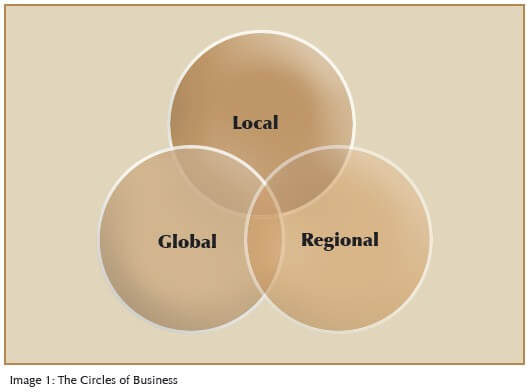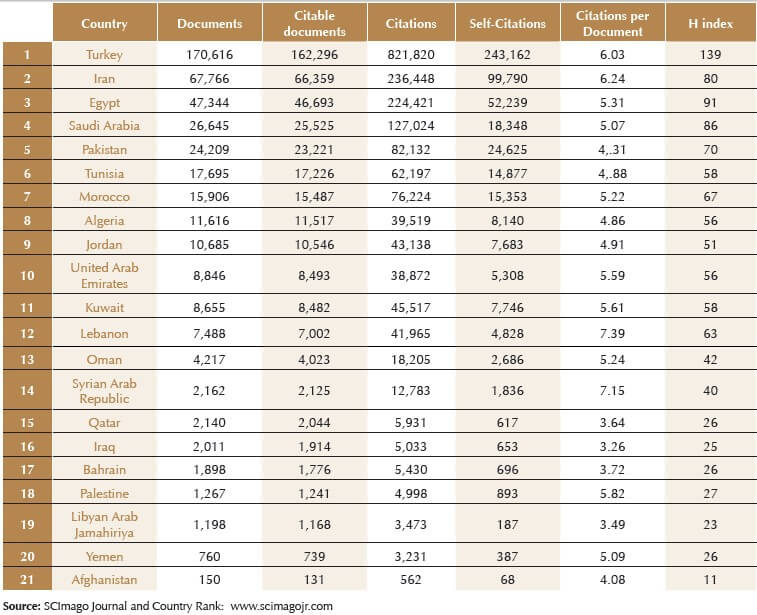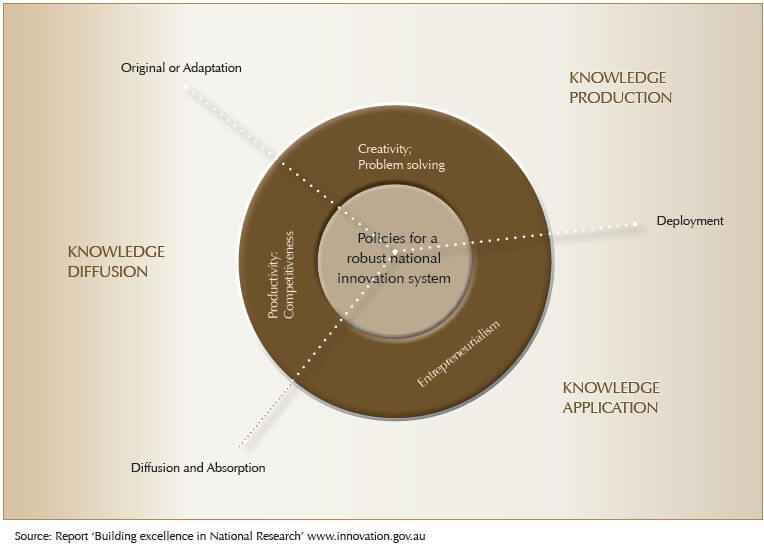Image Source: Pixabay via Pexels
The purpose of this article is to explore the status of primary innovation and research in the Arab region, and in the context of regional businesses. Trends would indicate that research has not been a primary focus in the Arab world, but regional and global economics necessitate that this is something that needs a quantum shift if Arab businesses want to sustain their growth, and compete both regionally and internationally. Alastair Cook, Regional Vice President of Emerald Group Publishing, UAE, does not aim to identify outcomes for specific businesses or sectors, but to determine and analyse the reasons for the need to change, and generically assign the building blocks that need to be developed, or built from scratch, in order to achieve these goals.
Any successful business in any part of the world exists within a number of interlinked concentric circles, which overlap. These circles can have different names or descriptors, but, broadly speaking, they would encompass three simple dimensions: local (or family), regional, and global (image 1 below).
The headlong growth in some parts of the Arab world over the past two to three generations (and in turn the need to provide manageable growth to Arab countries and businesses, which have yet to grow to the same extent) seems now to be at a crossroads, partly exacerbated by recent global economic strife.
The global crisis is maybe also an opportunity to take stock and reflect on what has actually been achieved (sometimes at break-neck speed), and make informed decisions on how sustainable wealth-creation is going to continue into the next generation. Keys to sustainable growth in the future can be reduced to two core areas: research and innovation, and development and enhancement of human capital. While trying to avoid ‘truisms’, it is a fact that that any organisation is only ever as good as the quality of its employees.
What is actually meant by innovation? Innovation is the conversion of knowledge and ideas into a benefit, which may be for commercial use or the public good; the benefit may be new or improved products, processes or services. Innovation is commonly described as ‘creating value by doing things differently’; or doing something in a novel way’. It is simply putting good ideas to work!
Research and innovation has a mixed history in the Arab world. In some countries with ‘emerging economies’, the education system is rich and historically comparable with those of the ‘emerged’, whilst in others (often with great material wealth) there is paucity. There are also contrasting extremes across both the Arab speaking world, as well as non-Arab neighbouring nations. In Iran, and particularly Turkey, there is a high level of fundamental research, and therefore investment in research and development (R&D) by the governments. Smaller countries, such as Tunisia or Jordan, with relatively small populations and limited natural resources, also have relatively high R&D levels. However, many Arab countries, particularly within the GCC (such as the UAE, Kuwait, and Saudi Arabia), which have high GDP per capita, have to date invested relatively little in research and knowledge economies.
While it is important to understand the reasons for this, it is even more important to realise why such a fundamental need for change is required in businesses across the region.
Many government initiatives across the region have now recognised the need for economy planning with a vision of what transformation is needed in the next 20 years. The UAE federal government has a 2030 vision of the changes that are required in order to create sustainable and manageable economies, one pillar of which is the need to create a knowledge society, which means a diversified economy where knowledge is produced, and not just consumed.
Historically, it may have been felt that the word research is something, which is conducted within academia, much of which is theoretical and has little to with the day-to-day challenges of managing and growing businesses. This is not the case, and it is indeed a risk to believe that little of what is innovated within universities is of little practical value to regional businesses.
Primary research is a key area for the growth and establishment of knowledge-based public and business policy. Socio-economic indicators show that growth in this region has in part been funded by global mineral wealth dependency. Diversification into a knowledge-based economy is thus paramount in terms of mineral wealth depletion and also environmental and sustainability issues.
Indices also show that, in many Arab nations, economies are much bigger than are needed to employ all nationals. Another commonality is the uneven regional distribution of income across the Arab world, and, with few exceptions, the low public debt, which is actually a very positive advantage in terms of having an existing, but narrow, window of opportunity to effect change now.
What is a Knowledge Economy?
A knowledge-driven economy is one in which the generation and exploitation of knowledge play the predominant part in the creation of wealth, and economic prosperity depends upon knowledge creation and learning.
The World Bank has outlined the key four pillars to sustain this drive towards creating a knowledge-based economy, i.e. ICT infrastructure and skills, the educational system, the innovation culture, and general education and job-related skills.
While governments can assist in creating the educational framework, and to some extent the economic incentive regimes to underpin the connection between governments and businesses, it is businesses themselves that need to be involved in driving innovation issues forward.
Innovation is a dynamic, evolving learning process. According to Cutler (2008) there are three highly interdependent functions within an innovation system: knowledge production (the origination of new knowledge and ideas); knowledge application (the deployment of knowledge and ideas in the real world); and knowledge diffusion (the absorption of this applied knowledge and its adaptation in use).
So why innovate? There are many reasons: to respond to new customer needs; to contain costs and improve efficiency; to improve service delivery and outcomes; to take advantage of new technologies. There are also many types of innovation: products and services; delivery of services; administrative and organisational, e.g. system re‐engineering; conceptual, such as changing behaviour and attitudes).
While cultural issues and beliefs across the Arab business world are important, that does not distinguish the Arab region from any other; in fact, it can offer opportunities to the market place, e.g. the exponential global interest in Islamic banking products and services, and new disciplines such as Islamic Marketing, which highlight methodologies in branding businesses better to existing and new market places. The Arab region also needs to, research, invest and produce in areas such as Sustainable Development, e.g. the initiatives already undertaken at Masdar City near Abu Dhabi.

Research has a significant role in private sector innovation, and therefore creating opportunities for better wealth creation and distribution. Best‐practice business innovation policy is evidence based, i.e. comes from existing knowledge (which may not have yet been disseminated). This is not about sharing the secrets of success with your competitors, but it is about aligning business locally, regionally, and ultimately globally to focus upon the outcome you wish to achieve and the impact of that outcome.
Therefore the outcome is the answer to a question, and in essence knowledge comes from combining data with analysis. Combining data with analysis means research, and implies that a business needs to state the desired outcome clearly and specifically, determine the best method(s) for answering the question, assemble the data needed, and perform the analysis. This will lead to conclusions and recommendations (that achieve the outcome).
Profitable links between education, innovation, and business
Innovation is key to business in innumerable ways. In the USA, and parts of Europe and Asia, there has been a realisation that knowledge has economic value, and that for generations this knowledge was leaving academic institutions without its value being realised, and therefore perpetuating the universities’ struggle to balance the books and ability to offer quality education.
Many universities now have Technology Transfer Offices, which act as the point of focus for the commercialisation of innovative technologies arising from research within academic institutions. Commercial exploitation of new products, processes and strategies allows these institutions to commercialise the outputs of research activity, by identifying those with commercial potential. This promotes an ethos of looking at the commercial value of Intellectual Property, generated in the course of research activity, as being a normal and automatic consideration.
Links with business and industry can take the form of other profitable partnerships, for example recently companies in Saudi Arabia have started sponsoring PhD programmes at the newly launched KAUST University near Jeddah. Nesma, a 100% Saudi-owned holdings company, as part of their Corporate Social Responsibility (CSR) programme, have provided funding for 28 PhD and Masters programmes, with a preference that these go to Saudi nationals.
CSR programmes are means to an end, in terms of attracting, retaining and training staff. CSR should not be viewed as a voguish programme of activities, but something that can have a profound and high impact when implemented, and with the involvement of the very top of any organisation. Effective CSR programs are aligned with the corporate or business mission, and are based around Action Learning, i.e. they involve all key functions in the company, including marketing, public relations, and human resources; they also integrate philanthropy along with volunteerism and non-profit board service, as well as environmental practices.
Professional growth needs to be maintained at all stages of a career path and, effectively managed; this is a key issue on business growth and retention, motivation and development of employees. Companies with strong CSR programs distinguish themselves in the marketplace, establish strong bonds with clients, customers, employees, and policy makers, and provide unique opportunities for leadership development.
The need for business to work on innovation with government and academia
All of these fact indicate, in terms of how Arab businesses need to respond, a need for stronger links between governments (in terms of research policy, and investment in quality education), the public sector (in terms of applied services to communities and society) and the corporate or business world (in terms of application of innovations to create, and re-distribute wealth).

This investment and commitment is also required because of other social and demographic reasons. Growing and, in some cases, overwhelmingly young populations need education systems, which can teach them to compete in a local, regional and global business environment. Public sector job reliance is no longer an option. Burgeoning populations, and migration patterns across the Arab world, also means that successes need to be shared so that they can be replicated in a variety of economic systems and circumstances.
Research groups are needed with a proper mandate to work with business leaders, and thus link together the knowledge and expertise to create a workable R&D policy. Industry and commerce cannot exist within a vacuum, and the support of professionals, leading academics, and government officials are needed to create and nurture a tactical implementation of a progressive but workable strategy, i.e. a practical but visionary policy.
Of course, investment and commitment is needed to achieve this, but, as recently witnessed in the region, and globally, one causality of the recent global recession was the misguided belief that made businesses and governments pursue stratagems that had to be based to some extent on intuition because of a lack of empirical support from other sectors or experts. The most glaring example of this is the excesses of the real estate sector globally, where in many countries houses and offices have been built for populations, which do not exist.
Conclusion
Mistakes can be made, and can often be a mixed blessing for nations in terms of learning from them, but businesses do not have this luxury.
Innovation, and the need to engage in it, or benefit from the outcomes, depends on many aspects, but the key aspect evolves around access to relevant existing knowledge, and having the desire and methodology to achieve new and improved results. Investment and commitment is needed, along with a joined-up and progressive R&D programme, as already described, which links up government, academia and business enterprise.
The challenge, for publishers, is how to assist in the discourse and dissemination of relevant information. Lengthy academic research papers may be anathema in the fast-paced environment of a regional Arab business, but case studies, and other ways of encouraging the sharing of relevant experience information cannot afford to be overlooked.
Applying knowledge in new and innovative ways is at the heart of growth and success. Access to regional and global expertise is a prerequisite to uncover and decide upon the practical implications of innovation-related decision-making. Proper channels for communication, along with professional and intellectual discourse, will result in a vision for achievable and sustainable growth, along with good governance.
Tharawat Magazine, Issue 8, 2010



















